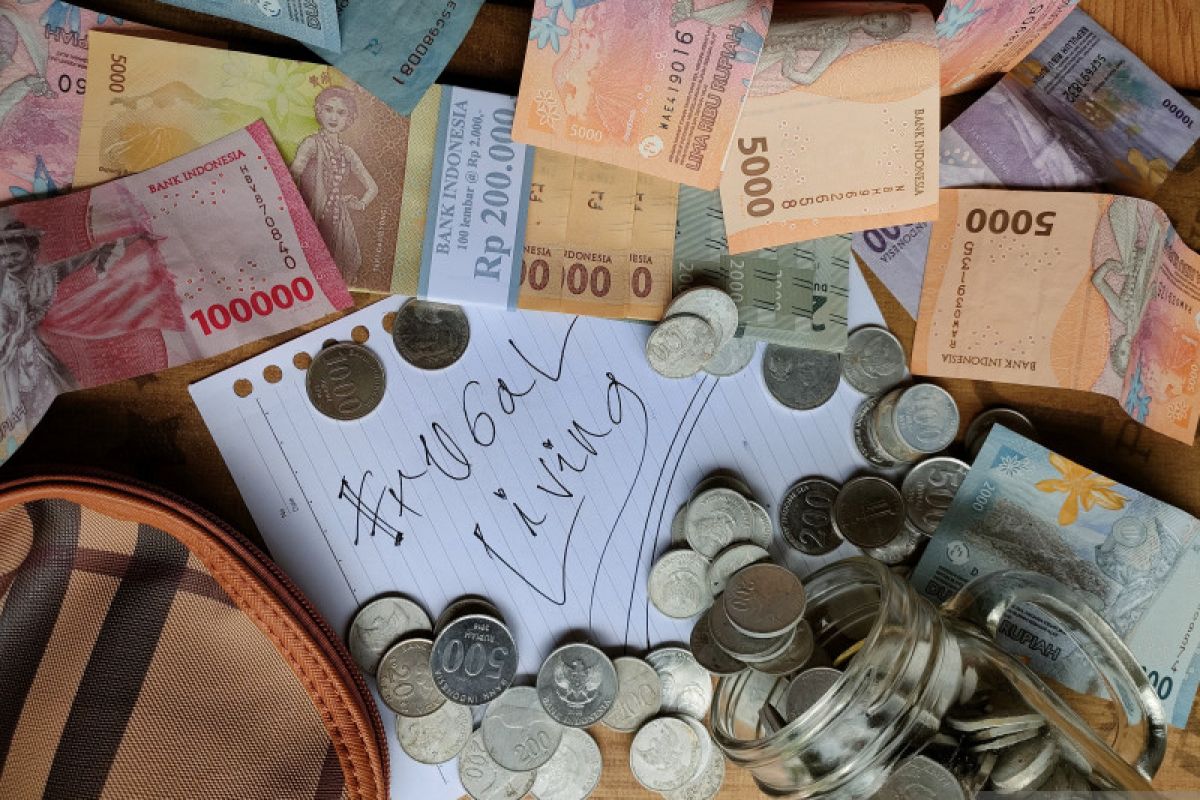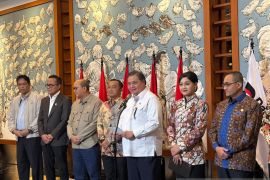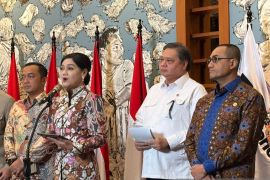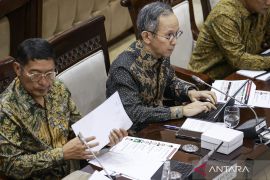On several occasions, President Joko Widodo has reminded people of the threat of global economic recession in the hopes that it would not impact Indonesia.
The head of state also consistently underscores the importance of being efficient in spending the state budget.
Nonetheless, despite those reminders, some regional leaders still corrupted the budget for development.
The president also reminded the state's apparatuses to spend money wisely by not hosting extravagant events that take up excessive amounts of money.
On a national scale, being frugal has become a necessity so as to avoid being impacted by global recession.
It also aims to reduce the risk of getting into more debt as well as to achieve economic independence. Such approach must also be adopted by individuals and families.
According to the Financial Services Authority (OJK), having financial freedom does not exactly mean having a lot of money.
Being free financially means that one can live a decent life with no debts.
A simple life
Our ancestors led a simple life by hunting and gathering. Only few people of the past era hoard their wealth and live a lavish life.
In current times, the frugal living concept is still firmly rooted in some regions, expert on economy from Semarang's Diponegoro University, Central Java, Imam Prayogo stated.
"Our ancestors taught us about frugal living, and it can still be seen in some places. For example, Yogyakarta, Surakarta, Madiun, and many other regions," he remarked.
People of those places lead simple lives, as shown by the houses they live in, their jobs revolving around agriculture, trade, and other similar jobs that do not consider rankings.
"Social life is very much so simple. (It is) different from people of urban areas where they highlight styles like socialites," he remarked.
Such lavish lifestyle serves as a great opportunity for businesses and banks to exploit. It leads to several instant online loan services sprouting everywhere, attracting several urban youths. It comes as no surprise that the country is at risk of recession.
Prayogo observed that in several developed countries, frugal living has been adopted as a strategy to survive.
"Hedonism is only (temporary) in such a lengthy life. Hence, Western people (of developed countries) have grown aware and slowly left (leading a) hedonistic life," he remarked.
He regretted that a hedonistic lifestyle now plagues poor and developing countries instead.
Some members of the Gen Z are ashamed to look poor, he stated.
Cases, such as students being embarrassed of their fathers attending their graduation event in old motorbikes, circulate a lot on social media.
Moreover, online frauds that resulted in hundreds, millions, and even billions of rupiah in losses being incurred were perpetrated by members of Gen Z.
He recalled a news that went viral recently in which young adult twins from lower socio-economic status committed fraud to siphon off billions of rupiah, just so they could go shopping overseas.
In Africa, there is La Sape, a term used to refer to youngsters having collections of high-end fashion brands, though facing difficulty in meeting their basic needs.
Emeritus Professor of Philosophy of Education at the UCL Institute of Education John White wrote in his book titled "The Frugal Life, and Why We Should Educate for It" that future generations should live a frugal lifestyle. It is not only for poor or developing countries but also for developed countries.
The ever-increasing global population coupled with limited resources forces people to adopt a frugal lifestyle and use the resources as necessary.
White opined that frugal living is also about efforts to save the earth.
To live frugally or to live in hedonism
Frugal living has been largely campaigned to oppose hedonism.
Several public figures, state officials and their families, who show off their hedonistic lifestyle, now have to live dreadfully after being arrested by the Anti-corruption Eradication Commission (KPK).
The government also appealed to state civil apparatuses to live frugally, considering the money and facilities they enjoy came from the state's budget.
The fact is that most of the state officials caught in corruption cases were lured by the temptation of a hedonistic life.
Rich people in several countries choose to live a simple life and give most of their wealth to charity, such as Alibaba's founder Jack Ma, Microsoft's Bill Gates, CEO of Berkshire Hathaway Warren Buffett, and Facebook's Mark Zuckerberg, as well as Djarum's boss Bambang Hartono.
People are in awe of the simple lifestyles of those rich people.
Hartono once went viral, as he was seen in a t-shirt eating tofu in a warung, or a very small traditional retail, in Semarang.
Jack Ma, too, still eats instant noodles instead of dining at an expensive restaurant.
Similarly, Bill Gates, who likes fast food, was once found queuing up for a burger somewhere in Seattle.
Warren Buffett still uses a 2014 Cadillac XTS to go everywhere, and Mark Zuckerberg is not ashamed to use cheap cars.
People whose wealth exceeds trillions of rupiah never lead a hedonistic lifestyle.
Those rich people see that money is not everything. A true rich person would no longer need acknowledgement.
This is different from the people longing to be seen as rich.
Living frugally in moderation
Although frugal living is important, one should not take it to the extreme to the point of being a cheapskate and harming oneself in the process. Being frugal and being a cheapskate are two different things.
Being frugal means having full control of finances and only buying necessary things, with focus on getting the best quality offered at the price, whereas being a cheapskate means refusing to spend any money at all.
While buying something, a frugal person will buy an item of good quality despite it being a bit pricier, so it can last for a longer period of time, while a cheapskate will pick the cheapest item purely for the sake of keeping their money.
Seven things must be taken in consideration while adopting frugal living, though one can be flexible in its implementation. Those things include:
1. Making financial plans. One can note down monthly spending and formulate plans based on salary. If it gets too complicated, one can instead put a rough estimate as to how much goes into which area, such as daily operation, investment, debt, recreation, social funding, and emergency funds.
2. Buying and selling used things. Usually, people buy based on the function, so secondhand stuff is still okay, as long as the quality is still good. Unused things at home can also be sold for money, and it can also make the space bigger. Buying and selling used things is not always profitable due to product wear and tear. Hence, if one can forgo the financial aspect, it is better to give them away to others in need of it as good deed.
3. Making food menus. Food is one of the biggest sources of monthly spending. To save up money, one can prepare a menu for the entire month to plan for grocery shopping. However, people can get bored and their mood can change, so it is fine to eat and cook to one's liking once in a while, as long as it does not exceed the set budget.
God will help
Adopting a frugal lifestyle stems from two reasons, either since the condition forced them to or to reach a certain financial goal, such as early retirement or seeking financial freedom.
Whatever the motivation might be, one must avoid going the extreme way in order to follow a frugal lifestyle. Living way too frugally becomes a cause for concern because it looks as though one is torturing oneself and also questioning the future, which means that one is questioning God's grace.
Living a frugal life is an effort to survive, though God ensures a livelihood for everyone. Hence, do not worry too much!
Related news: Disband cruiser motorbike club: Indrawati to DJP
Related news: Expect talent management to build anti-graft spirit in ASN: VP
Related news: OIKN emphasizes need to practice minimal waste lifestyle in Nusantara
Translator: Sizuka, Mecca Yumna
Editor: Sri Haryati
Copyright © ANTARA 2023












